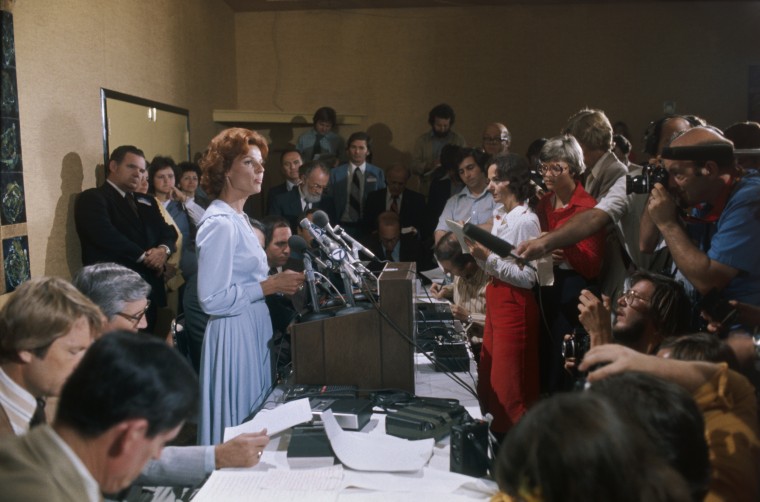The national war of words over whether students should learn about LGBTQ issues in school — ignited by a recently enacted Florida law that critics dubbed the “Don’t Say Gay” bill — has taken a charged, and some say dangerous, turn over the last several weeks.
In early March, the press secretary for Florida Gov. Ron DeSantis tweeted that anyone who opposes the bill “is probably a groomer or at least you don’t denounce the grooming of 4-8 year old children.” Several days later, Fox News host Laura Ingraham asked her millions of viewers, “When did our public schools, any schools, become what are essentially grooming centers for gender identity radicals?”
On Wednesday, Rep. Majorie Taylor Greene, R-Ga., took things a step further, tweeting that “Democrats are the party of killing babies, grooming and transitioning children, and pro-pedophile politics,” in reference to the legislation. That same day, in a since-deleted tweet accessed by NBC News through the Wayback Machine Internet Archive, the conservative podcast host Jack Posobiec urged his 1.7 million followers to buy T-shirts that say “Boycott Groomers, bring ammo” and incorporate the famous Disney castle logo and signature font. (The company, which has a large footprint in Florida, has become a frequent target of conservative politicians and pundits for denouncing the state’s legislation.)

This type of language — which had, at least in the past decade, appeared to be relegated to the margins of the far-right movement — has even made its way beyond politicians and political pundits. During a Fox News interview on Sunday, the Pulitzer Prize-winning playwright David Mamet said that children are “not only being indoctrinated but groomed” and that “teachers are inclined, particularly men because men are predators, to pedophilia.”
Alejandra Caraballo, a clinical instructor at Harvard Law’s Cyber Law Clinic and a transgender-rights advocate, said using such language is “an attempt at the dehumanization and delegitimization of queer people’s identities by associating them with pedophilia and child grooming.”
“What terrifies me is that when you start labeling groups with that, the calls for violence are inevitable,” she said.
The recent rhetoric mirrors that of a QAnon conspiracy theory — known as “pizzagate” — which claimed that a Washington, D.C., pizzeria was harboring a child sex-trafficking ring with connections to Hillary Clinton. The conspiracy theory, which was debunked by the FBI and Washington police, prompted a North Carolina man to fire a rifle in the pizzeria. He was ultimately sentenced to four years behind bars.
The word “grooming” — which has long been associated with mischaracterizing LGBTQ people, particularly gay men and transgender women, as child sex abusers — was mentioned on Twitter 7,959 times on March 29, the day after Florida’s education bill was signed into law, compared with just 40 times on the first day of this year, Caraballo found through data she pulled from Twitter.
The legislation, officially titled the Parental Rights in Education bill, bans teaching about sexual orientation or gender identity “in kindergarten through grade 3 or in a manner that is not age appropriate or developmentally appropriate for students in accordance with state standards.”
Proponents of the measure have contended that it gives parents more discretion over what their children learn in school and say LGBTQ issues are “not age-appropriate” for young students.
At the Florida bill-signing ceremony, DeSantis, who is widely believed to be considering a run for the 2024 GOP presidential nomination, said that opponents of the measure “support sexualizing kids in kindergarten” and “camouflage their true intentions.” He added that the law would ensure “that parents can send their kids to school to get an education, not an indoctrination.”
Tiffany Justice, an ardent supporter of the measures limiting LGBTQ instruction in schools and the co-founder of Moms for Liberty, a national network of about 80,000 parents whose mission is to defend parental rights in schools, said that the LGBTQ community is “a part of the fabric of America.”
Simultaneously, she said that “we have reached a point now where we need to call this what this is,” referring to the rhetoric surrounding the law.
“If you want to talk to my first grader about sex and sexual identity and gender identity and sexual orientation, and I don’t want you to and you’re doing it anyway, you’re grooming my child without my permission,” said Justice, who is also a mother of four school-age children. “And if anyone says that they don’t like that label, then I say stop messing with our kids.”
Scott Hadland, the chief of adolescent and young adult medicine at MassGeneral Hospital for Children and Harvard Medical School, called the law and the recent rhetoric surrounding it “fear-based.”
“I’ve cared for, in my more than a decade of clinical practice, hundreds of kids who identify as LGBTQ and the number of times that somebody has shared with me that they came to understand their development because they were convinced to become LGBTQ by a teacher, or another community member, or a physician is exactly zero,” Hadland said. “This does not happen. This is not how young people establish their identities.”
The tactic of labeling one’s political adversaries as “groomers,” or insinuating that they are trying to prime children for sexual abuse, is nothing new, said Michael Bronski, a professor of women and gender studies at Harvard University and author of “A Queer History of the United States for Young People.”
“There’s a long tradition of making accusations against a minority group, potentially an unpopular one, using the notion of violating childhood innocence, which is seen as the worst possible thing that you could do — to abuse the child sexually,” Bronski said.
“Overwhelmingly, they were never about the children,” he added, referring to the accusations. “They were about mobilizing power within the culture and doing political organizing around it.”
Bronski recalled former beauty queen Anita Bryant’s “Save Our Children” campaign in 1977, which painted gays and lesbians as a threat to the country’s youth. That year, her campaign was successful in overturning a newly passed Miami-Dade County law that prohibited discrimination based on sexual orientation in housing, employment and public services.
“Homosexuals cannot reproduce, so they must recruit. And to freshen their ranks, they must recruit the youth of America,” Bryant famously declared.
Decades after Bryant fortified a reputation as one of the countries most notorious anti-LGBTQ activists, her granddaughter came out as a lesbian during an episode of Slate’s “One Year” podcast and revealed that she was engaged to a woman.

When asked why these old tropes, popular in Bryant’s day, have resurfaced now, Bronski pointed to several LGBTQ policy wins in recent years — most notably the 2015 Supreme Court decision legalizing same-sex marriage, and the 2020 Supreme Court decision that won LGBTQ people nationwide protection from workplace discrimination — and greater numbers of Americans identifying as part of the LGBTQ community.
The percent of U.S. adults who identify as something other than heterosexual has doubled over the last 10 years, from 3.5 percent in 2012 to 7.1 percent, according to a Gallup poll released in February.
“If you have visibility for anything, whether it be for Black Lives Matter, whether it be for feminism, whether it be for LGBTQ identities, you are in fact creating a cultural space for people to learn about it and consider it,” Bronski said. “Any form of social progress engenders backlash.”
The backlash is what worries Caraballo. She notes that June 12 will be the sixth anniversary of the mass shooting that killed 49 at Pulse, a gay nightclub in Orlando, Florida.
Hate crimes against LGBTQ people across the country are down overall, according to FBI data released last year, but have risen for incidents motivated by gender identity within the past two years. Late last year, LGBTQ Americans were spooked when federal prosecutors arrested a man who they said threatened to attack this year’s New York City Pride March with “firepower” that would “make the 2016 Orlando Pulse Nightclub shooting look like a cakewalk.” And this month, a man walked into a New York City gay bar, Rash Bar, with a bottle of flammable liquid, poured it on the bar’s floor, lit a match and set the venue on fire.
Caraballo said that social media companies like Twitter have a responsibility to curtail the rhetoric from proliferating online and thus stem the threats of violence.
“What worries me is that it’s going to take people getting killed for them to finally crack down,” Caraballo said. “I fear we’re going to end up with another Pulse.”
“My message to social media companies is,” she added, “‘Don’t wait till you have blood on your hands.’”
Twitter did not immediately respond to a request for comment concerning several of the more high-profile tweets mentioning the word “grooming” in association with the new law.
One of the tweets came from DeSantis’ press secretary, Christina Pushaw, on March 4: “The bill that liberals inaccurately call ‘Don’t Say Gay’ would be more accurately described as an Anti-Grooming Bill.”
Pushaw elaborated in an email, saying that “the assumption that criticism of grooming is criticism of the LGBTQ community equates LGBTQ people to groomers, which is both bigoted and inaccurate.”
